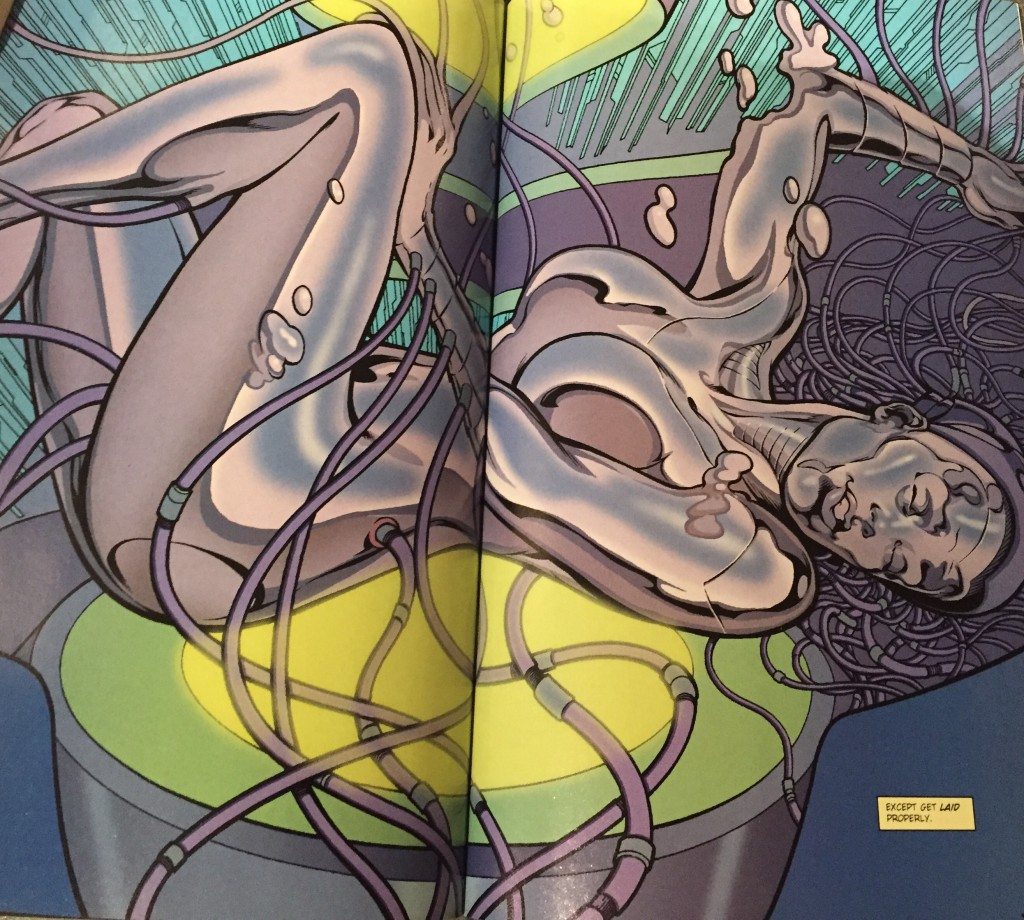There aren’t many examples that come to mind when one is asked to find a sex-positive instance of a female superhero getting her groove on. It’s almost funny: fanboys like to talk up Emma Frost as sexually empowered, but has that woman gotten any good ass lately, or ever? Then on the other side of the pond, the only recent DC Comics example who came to mind was Batwoman in her “New 52 Batwoman #4” tryst with her fiancée, Maggie. Readers got so angry at DC’s editorial for not letting Haden Blackman and JH Williams III marry Kate and Maggie that most of them forgot to thump the two of them on the back for depicting loving, non-exploitative lesbian sex at a time when most everyone else in that universe was too busy either not getting laid or getting laid in the worst way (looking at you, “New 52 Catwoman #1”).
The truth is, the comics industry is historically run, creatively and otherwise, by heterosexual men. Many of these men often choose to use female characters for gross aesthetic purposes and plot devices instead of representing them as people. Although much of the industry jumps at the chance to see any female character caught in a sexual position, it’s difficult to find instances where female characters are truly empowered sexually.
This is what makes Paul Jenkins and George Jeanty’s short comic, “Isolation,” so rare. Published in the 2001 anthology, Wildstorm Summer Special, “Isolation” is one of three short comics and three pin-ups representing the small imprint’s properties. Relatively impressive names themselves, Jenkins and Jeanty are surrounded by the likes of Warren Ellis, Cully Hamner, Brian Azzarello, and Brian Stelfreeze, to name a few. Indeed, Wildstorm Summer Special as a whole is a forgotten gem that contains quite a bit of impressive work.
A shame, really, since it contains this:

The woman depicted in this panel is Dr. Angela “Angie” Spica, otherwise known as The Engineer, from Wildstorm’s superhero team The Authority. Separate from this panel, Angie has a beautiful resume. Coming from a blue-collar, Latinx-American family and told all her life that she would never become like any of the superheroes in the comics she read, Angie responded by clawing her way up an (unspecified) STEM field. The original Engineer, recognizing her potential, passed on his nanotechnology research to aid with her research on human-machine fusion. Thus, the silvery liquid you see above exploding from her as she climaxes—that’s her Engineer abilities rushing to retake her body in her moment of ecstasy.
Sex is funny
“Isolation” is a comedy, which embraces the melodrama of a superhero who looks like she has everything, but feels like she has nothing. Stuck living on The Carrier, The Authority’s ship, Angie is left isolated from the majority of humanity. “I’m no closer to understanding love than [people on Earth] are to understanding nucleic cluster variability,” she laments. But it’s not all that sad—the comic opens up with several panels of The Engineer’s long, fluid fingers traveling and caressing all of her shiny, lithe body, which indicates that masturbation provides some sort of temporary relief. Jeanty, in his choices to depict Angie’s hitching chest, her sliding hand, her fluid crotch, her smiling mouth, captures the mood so that readers feel the growing pleasure along with the character. Thus, the pleasure climaxes when the next page opens up to a spread page of Angie’s full body.

Angie isn’t the type of character to sit around and wait for a solution to come to her. A scientist and an inventor, she is a natural problem-solver. Thus, after a mostly one-sided conversation with her frustrated and distracted teammate, Midnighter (a gay character who only recently experienced his own sexual liberation in his recent title by Steve Orlando and ACO), Angie takes off to Earth. She knows exactly what she needs (“some stubby little Mexican guy with tequila on his breath an’ way too much hair on his chest—that’s what turns me on!”) and she’s going to get it. In fact, it takes only one page to find her in a bar on Earth, successfully seducing a target.
Ramon, her conquest, is alarmed by her enthusiasm from the beginning. Throughout the entire sexual encounter, Jeanty draws Angie on top. Jenkins’ dialogue practically has her babbling, her moans of approval borderline pornographic. The thing she has Ramon say in Spanish is definitely pornographic, hilariously so, yet it doesn’t take away from how much fun she’s having. This sexual encounter is purely by her own design, and while women having sex in fiction often comes with consequence, the one that results in “Isolation” is minimal. Ramon runs away because Angie is too powerful. But not before she achieves her goal (and her orgasm).

For certain, “Isolation” isn’t perfect. While the narrative empowers Angie, Jeanty often draws her in submissive, positions that pander to the male gaze. It also contains homophobia, all-too-typical to this period of comics. But in an era where The Engineer, a few of her team mates, and many other superheroes had their agency torn from them via rape narratives, this is a comic that stands out. It’s funny, irreverent, and not ashamed to be sexual. It’s the kind of comic with the kind of protagonist women need more of.

